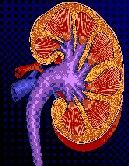Article
'Lab-built' Kidneys Show Promise in Recent Testing
Author(s):
Researchers at Wake Forest Baptist Medical Center recently announced a breakthrough in the development of a replacement kidney.

According to a study published in Technology, a North Carolina team reported using “human-sized pig kidneys” and finding ways to keep blood vessels open and flowing better than previous tests have been able to.
“Until now, lab-built kidneys have been rodent-sized and have functioned for only one or two hours after transplantation because blood clots developed,” noted Anthony Atala, MD, director and professor at the Wake Forest Institute for Regenerative Medicine, in a statement from the school. Atala also served as a senior author of the study.
“In our proof-of-concept study, the vessels in a human-sized pig kidney remained open during a four-hour testing period. We are now conducting a longer-term study to determine how flow can be maintained,” he added.
The results of the study showed that by more effectively coating the vessels with endothelial cells, which they said helped the blood flow to be smooth and could help with similar research involving other organs. Study authors noted that this is just one part of their work to build “scaffolds,” or support structures that could be used to make replacement kidneys in the future. The newly made organs, they said, could help patients in the latter stages of renal diseases.
As part of the process, the researchers work to remove the animal cells from the organ, leaving what they referred to as a “skeleton.” This structure would then have the patient’s cells built in “making an organ that the patient theoretically would not reject.”
Prior studies have shown considerable issues with clotting in the organs which was one of the main obstacles the researchers sought to overcome. The study noted that this was accomplished by studying different ways the cells could be introduced into the scaffolding. That work showed the most effective way was to infuse the cells with a syringe and pump cells through the vessels in increasing flow rates according to the statement.
Once that process was established the researchers then worked to make the scaffolding more “sticky,” according to the statement and also to bind the endothelial cells. “Laboratory and imaging studies — as well as tests of blood flow in the lab – showed that cell coverage of the vessels was sufficient to support blood flow through the entire kidney scaffold.”
Once that work was done the researchers then implanted the kidneys into pigs weighing up to 110 pounds. The researchers noted that through a 4-hour test the vessels remained open.
“Our cell seeding method, combined with the antibody, improves the attachment of cells to the vessel wall and prevents the cells from being detached when blood flow is initiated,” noted laud author In KapKo, PhD, who also works as an instructor in regenerative medicine at the hospital.
The researchers said more studies will need to be done on the efficacy of the work with blood clotting when the endothelial cells are attached. They also said that while it was one step it the process, it was a big one.
“The results are a promising indicator that it’s possible to produce a fully functional vascular system that can deliver nutrients and oxygen to engineered kidneys, as well as other engineered organs,” Ko added.
The study was supported in part by Telemedicine and Advanced Technology Research Center at the US Army Medical Research and Material Command.


